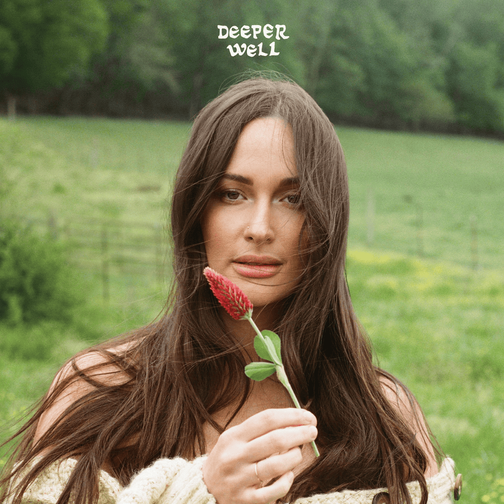Deeper Well

If I could eat a horse, then a flame could eat a stable, and Hell could devour what is left of the scorched earth. In my circles, fire is called the Final Law. It wipes the slate clean in preparation for High Entropy.
Musgraves is an old name, derived from two Anglo Saxon words - “mus” for mouse, and “grave”, that familiar hole in the earth. Not a rodent cemetery but a ditch filled with mice. The first bearers of this name lived in those places - subterranean hovels. Holes that bring their own mortal comforts.
And so on “Deeper Well” we find ourselves inevitably reaching downwards. This is no mere cistern, but an excavation of groundwater from below the earth’s rocky crust. In Emmylou Harris’ 1995 serenade of the same name, the well is a holy grail that tempts us down into the dirt. “I was ready for love… for the money… ready for the blood and ready for the honey… looking for the water from a deeper well.” Musgraves sees a different light in the same dark waters. “I used to wake and bake… hit the gravity bong that I made… [but] I’ve gotten older now, I know how to take care of myself… I found a deeper well.”
A gravity bong, as most grass-engineers know, is, in a sense, a type of well. There are two ideological branches - the bucket bong and the waterfall bong - but both use the interaction between water and its container to manipulate three crucial elements: fire, air and cannabis. In the song’s video, directed by Hannah Lux Davis, Kacey is a lone star, wandering through a pastoral afterlife. She’s guided by (and ultimately becomes) a glowing orb. Grassy boulders are peacefully, telekinetically thrown into orbit. Finger-picked acoustic guitars flow over a walk-on-the-wild-side bassline, while vegetables and cattle are playfully inspected. There is a oneness, perhaps guaranteed by her cliffside isolation - but at what cost?
Scrape the bottom of a well and you’ll find that primordial, excremental jelly. A soup made from the twin kitchens of life & death. The jewel of this album is hidden deep in a room where there are no corners, only circuitous paths. Big Streaming brought on the demise of the beloved “secret track”, a golden nugget of audio that would play 30 or 40 minutes after the final track, right at the edge of what a CD could hold. The internet’s true form - an infinitely labelled library - does away with ambiguous endings, but somehow Musgraves and her highly specialised team have found a workaround. By playing tracks 1, 9, 8 and 8 again (and listening in full), one can then scroll to the end of the album to find a new track, exactly 14 minutes in length and simply marked “Untitled”. Be it Spotify, Apple Music, Tidal or other rivals - this is a combination lock whose sequence can only be cracked by streaming, listening and longing.
If, while dreaming, you encounter a well, you must carefully observe its qualities. Is the water clear or murky? Is it overflowing or running dry? Do you desire to drink it or bathe in it - or perhaps even submerge in it? These questions, and their shimmering, reflective answers are at the heart of Kacey’s “Untitled” odyssey, a self portrait drawn by both skimming and sinking stones. The track starts with a generous silence, followed by a cavernously deep drone, like a double bass carved from fallen oak. The whispered opening lyrics (which appear about 2 minutes in) repeat themselves endlessly, more time-keeping than melodic device. “In darkness let me dwell… the ground shall sorrow be.” Over that knotted bed, the Texan songstress weaves an incredibly multi-layered tale, as if describing a small town from memory, with its characters and their deeply intertwined lives. The construction worker’s wife, the relic she found under the floorboards of the abandoned radio station, the new mayor and her revival of the historic downtown, the unintended closing of the evergreen ‘Wet Petals’ florist, in turn causing the hotel receptionist to fall short on his wedding anniversary plans. The wheel keeps turning, its cast rising and falling, sun and moon in correspondence.
Kacey’s hometown was named by a railroad official, who combined the names of his daughter Ola and her friend Minnie to create the city of Mineola. Names become places as places become names. We weave a map of the known world just by asking each other for directions. But if we are all to find our own deepest well, what becomes of the cities we built up above?
Beware the snicker-snack, the fiery maw, oh flibbertigibbet hungry claw. Extinguished here to quell a spark, a phantasy of sunset dark. Believe the bric-à-brac, the mighty yore, the outline of beasts Neptune saw. Excalibur drawn a forest fell, no reverie to ring its bell.
If Hell is other people, then critics are surely demons of the Highest Order? And what to call that ruby red trident if not a Witchfork? An impossible object for that impossible, magical act of objectification.
There is an Old English word ‘dustsceawung’, meaning contemplation of dust. The crumbs and detritus that surround us like footprints, invisible to the untrained eye. Yet Musgraves is a master of the myopic, the microscopic, and the misadventure of melancholy - more than most modern musicians. From the East Texas timber belt to the Honky Tonk Superhighway, she has only just stopped short of finding a pot of gold at the end of her rainbow. They say music is like the weather: unpredictable but observable, a deific conversation, iridescent sunshine behind the never-ending rain. While Kacey’s bong lies discarded in the trash, her glass is more than half full, and her well overfloweth with clear, fresh water. Well, well, well, the bard-doctor says. Pray God it be.